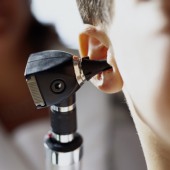
FRIDAY, April 23 (HealthDay News) — Inserting cochlear implants early significantly improves spoken language comprehension and expression in young children who have severe hearing loss, a new study shows.
Researchers assessed spoken language development over three years in 188 children who underwent cochlear implantation before they were 5. The improvements in spoken language performance were much greater than would have been predicted by the children’s pre-implant scores on tests of spoken language and comprehension.
The younger the children were when they underwent cochlear implantation, the greater the improvement.
A cochlear implant — sometimes called a “bionic ear” — is a small electronic device surgically implanted in the inner ear that stimulates the auditory nerve and allows people who are profoundly deaf to hear many types of sounds.
“Significantly higher rates of comprehension and expression were noted in children undergoing implantation at younger than 18 months compared with children undergoing implantation at ages between 18 and 36 months and at older than 36 months,” research leader Dr. John K. Niparko, of the Johns Hopkins University School of Medicine, said in a news release.
In fact, most children who received implants prior to 18 months of age showed trends in improvement that paralleled those of the “control” group of children without hearing loss, Niparko added. Cochlear implantation after 18 months of age, however, was associated with less favorable trends of improvement in performance “and greater variability in measures of both comprehension and expression,” he said.
He and his colleagues also found that greater rates of improvement were associated with higher levels of residual hearing prior to cochlear implantation, better parent-child interaction and higher socioeconomic status.
These findings underscore the need to develop objective tools that can evaluate the benefits of hearing amplification in the development of spoken language “and guide timely intervention” with hearing implants, the researchers concluded.
The study appears in the April 21 issue of the Journal of the American Medical Association.
More information
The Nemours Foundation has more about cochlear implants.

